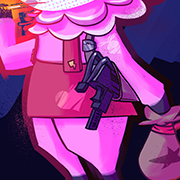|
Hey, I was wondering if anyone knew about a staffing company called The Boss Group. They contacted me about video editing, and while I would like to follow up, a lot of the reviews I'm seeing about them are 50/50, so I'm not sure. Anyone had any experience with them?
|
|
|
|

|
| # ? May 16, 2024 04:48 |
|
Anybody have experience with the film workshops offered by maine media?
|
|
|
|
I'm back on the job hunt, and I'm feeling kind of stuck. For the past four years I've been working on super high end custom design, and as such I can't share ANY of it without legal repercussions, I can't even say who my clients are. This is making job hunting really loving hard because all I have in my portfolio is student work, which doesn't reflect on my skills as a designer now. I could throw together some fake bullshit products to put in my portfolio on my own time, but that won't help me against someone who can point to an actual real product people buy and say "I designed that". What should I do here? My current portfolio doesn't represent me today, but I have nothing I can add to it. But at the same time submitting NO portfolio is just as bad.
|
|
|
|
I see that kind of thing posted often (not just here, but lots of places) and I always think "really?" and then never ask about it. So I'll ask – really? Were you employed by someone previously or were you a freelancer? Either way, do you have contracts you can look at? A good contract should protect your right to display work in your portfolio and in other forms of self promotion. I know that my employment contract with my previous place of work had a clause that specifically let me use anything I worked on in my portfolio, and the business had a line in all their contracts allowing them to use the work in their portfolio, so therefore I put whatever I want wherever I want. Also, even if you aren't contractually allowed to show the work in your portfolio I would say put it in there anyways and stick a password on it. Send the password to potential employers when you send them a link to your portfolio. Black out the logo or something if you want to protect yourself, but honestly I think you're worrying about this more than you should be. Do you really think a huge company is going to A) somehow learn you have that work in your portfolio (especially if it's password protected) and B) take the time to sue you over it? IANAL and all that, but a contract that prevents you from finding a new job because you can't show any work sounds unenforceable. That's why non-compete agreements in employee contracts get thrown out of court so often. Go ask the law thread to be sure. e: Also, if you've really been doing super high end custom design for years you should be able to throw something together that would easily compete with a real world product. In fact it would probably be better than a real world product because you wouldn't have had a client making GBS threads all over your good ideas. The whole, "it really exists" argument matters far less to potential employers than you think it does assuming you have a lot of experience and can talk about it. kedo fucked around with this message at 23:33 on Apr 1, 2015 |
|
|
|
kedo posted:I see that kind of thing posted often (not just here, but lots of places) and I always think "really?" and then never ask about it. So I'll ask – really? Were you employed by someone previously or were you a freelancer? Either way, do you have contracts you can look at? A good contract should protect your right to display work in your portfolio and in other forms of self promotion. I know that my employment contract with my previous place of work had a clause that specifically let me use anything I worked on in my portfolio, and the business had a line in all their contracts allowing them to use the work in their portfolio, so therefore I put whatever I want wherever I want. I designed interiors for head of state wide body aircraft. As in the interiors of these planes are state secrets requiring top secret clearances in their countries of origin. I CANNOT reproduce any of it, nor can I save files off of a computer at work without getting in deep, deep poo poo (all the USB ports immediately kill anything plugged into them that isn't previously cleared by the company and it sends a flag to IT who then flags your manager and basically the entire internet is blocked). I cannot stress this enough. I currently work at a less extreme fancy place but I function more as an engineer than designer so stuff I do now is kinda meh which is why I'm looking to move on and back into a design role. I can get a job in the aircraft industry no problem with no portfolio because they understand this, but I'd like to cast my net wider than just aircraft and that's where I run into this problem.
|
|
|
|
Ah, well that's a whooooole 'nother ball of wax. I incorrectly assumed you were one of the five million graphic designers who say stuff like this on a daily basis and are just plain wrong. Honestly not sure what to tell you in that case, sorry. 
|
|
|
|
kedo posted:Ah, well that's a whooooole 'nother ball of wax. I incorrectly assumed you were one of the five million graphic designers who say stuff like this on a daily basis and are just plain wrong. I'm seriously considering emailing my portfolio class professor from school asking for help, but I'm not sure they can help me either (plus professors are hilariously out of touch with the actual job market most of the time). This industry seems to be a black hole for designers, once you get in it's hard to claw your way back out. I don't mind it but I like to keep my options open since there are very few companies in the industry and each one only employs a handful of designers, plus rolling from one multi-million dollar contract at a time to the next puts your job in jeopardy if just one contract falls through.
|
|
|
|
To get a job you need a portfolio, that's what we all do know. If your professional work can't apply, you need to start taking freelance and doing personal projects until you have a public-facing portfolio. At least put that you have worked for well known important clients on multi-million dollar projects or something. There are ways to communicate some of your experience without breaking rules. Use what you can however little it is, be creative, and get to building a new portfolio. Switching industries in any field requires a restart and a new portfolio from scratch, so it's not like the situation is unheard of. mutata fucked around with this message at 18:43 on Apr 2, 2015 |
|
|
|
Anyone have any experience with transitioning from a strong design background to a more technical field? Right now I'm thinking of going back to school for industrial design (master's) in the next few years, but I really don't feel informed enough about what that will actually mean for my career/financials, and what I really want to do. I have a BFA in graphic design and I'm interested in doing something with more of an engineering bent. This is super vague, I realize, but I'm casting a pretty wide net here just trying to gather information! Anyone willing to chat would be very much appreciated!
|
|
|
|
From what I have heard, industrial design is extremely competitive. Have you thought about UX/UI design? IIRC you have a pretty strong motion graphics portfolio and it seems to me like there's a lot of demand for good design & animation fundamentals for web applications. I only suggest this because it's the sort of thing that you could learn to do without having to invest in grad school. There are puh-LENTY of very technically-minded people in the programming business, but not enough who understand both good design principles and implementation.
|
|
|
|
Thanks for the advice! I haven't nailed down industrial design quite yet. Part of the reason for my vagueness is that all I really know for sure is I'm ready for a next step/change, and I'm flushing out my interests to see what's viable. UI/UX is something I've definitely looked into, but for some reason most info about it online is aggravatingly vague beyond 'do web design' and 'learn to program'. It's likely I'd just need to find a way to talk to some people actually doing it, though. I'll keep this in mind, I am trying to pick up more math/programming in my free time so I may be on the right track after all! If anyone here is a UI/UX designer, I'd love to talk!
|
|
|
|
I have an industrial design degree and in my job search more than half the hits are for UX/UI positions. I'm considering learning some basic coding and trying to get into that field if I can't find something I like in the aircraft industry.
|
|
|
|
Question for animation industry peeps! One of the clubs at my college has arranged to send a whole bunch of us to CTN in Burbank this November, and I am really excited to go, draw some things, absorb some wisdom and meet a whole bunch of amazing people. But I'm also a sophmore. I'd feel really weird handing out business cards when I'm still so early in my academic career, and I feel like any decent portfolio pieces that I could put together between now and then would be a pale imitation of what I could show at CTN next year. I've mostly done core classes thus far as opposed to ones that actually refine skills for the jobs I want to pursue (concept work and storyboarding). So, industry people: should I bother with the business cards and portfolio this early, or would it be a waste of your time? I want to make a good impression, and I feel like that's something I can do without necessarily giving out yet another student business card to overload your wallet with.
|
|
|
|
I'm not in the animation industry specifically, but IMO you should only hand out business cards, resumes, or links to your portfolio if there's a chance of them leading to actual work in the form of internships or job opportunities. As a sophomore you're not really in the position to pursue leads, you're too early in your formative stages for that. Instead, focus on leaving a great impression like you mentioned. The most important thing for now is to get your name into the brains of professionals so that in the future you're not just another face in the crowd to them. You'd be amazed how far a simple "oh yeah I remember that kid from when he visited a year ago" will get you. Links to your half baked sophomore demo reel? Not so important.
|
|
|
|
Collect business cards. Follow up on every single one. Ask for advice, see if you can sit down with them for lunch or coffee or even a few minutes in their office. Be humble but passionate. Keep in touch. When you're ready to work, they'll remember you.
|
|
|
|
That's what I was leaning towards. Thank you!
|
|
|
|
It's something I intend to do as well. After my local run-in with "rear end in a top hat who wanted me to work for the hopeful chance of being paid $1 per product sold" I'm going to be doing some proper networking and collecting stacks of business cards.
|
|
|
|
Hey there! So, I'm going back to school in the fall for a Digital Media and IT program. Enrolment starts soon, so I spent some time planning out my schedule for the classes I want to take. I wasn't really paying attention to the names of the teachers, just the days and times of the classes. Once I finally had a schedule I was happy with, I look at the teachers names and see the name of a teacher I had when I took a course through the college 7 years ago. He was the worst. Didn't "believe" in colour theory. My class nearly revolted against him. And now he's teaching 2 out of the possible 3 Visual Communications classes. I just spent an hour staring at the schedule again to see if there was any way I could get the other teacher without dropping important classes. There is not. Anyone have any advice for getting through a class with a teacher you've had issues with in the past? I know 7 years is a long time, but I'm still worried he'll be pulling the same bullshit that he was before.
|
|
|
|
Nessa posted:Hey there! So, I'm going back to school in the fall for a Digital Media and IT program. Enrolment starts soon, so I spent some time planning out my schedule for the classes I want to take. I wasn't really paying attention to the names of the teachers, just the days and times of the classes. I remember those days horrendously. But it's a good glimpse into the real world after you leave school. Sometimes you are absolutely stuck in a contract that seems against you yet you know you need to complete the contract or face worse consequences. Seeing that this is for the VC level course over the older course, there is a glimmer of hope that things have changed. One way to go into this is, this is a new contract of student/teacher. Be open-minded. Remember, teachers HAVE the experience of the field you want to be in (several of mine were part time because they were still doing their creative jobs full time!) so take that into consideration. Ask lots of questions, not because you hate the guy, but because you lack the experience. The questions should always be geared to your understanding of the concepts and how to apply them to your future goals in this field. Not everyone is going to see the same color of red as you, so ask. Don't ask ignorantly, but for clarity. And you know what? Ask the teacher for a one on one meeting if you're struggling. Because ultimately, their goal isn't to talk to heads. Their goal should be to provide you tools and practice for the real world. They've suffered too, and maybe by admitting your own faults and weakness, they'll become an ally in your educational growth. Worst case scenario, even after being being open to their teachings (especially if they counter from the vision of the course!), talk with a campus counselor or the program manager/dean. Let them know that, in the end, you felt and experienced the teacher didn't fulfill the requirements you sought in taking the coursework and that the teacher should be approached for their curriculum and teaching style. The best teachers are the ones who learn from their students. It has to be a balanced give-and-take. I have learned this the hard way after a year of teaching in Japan, so speak up to the higher ups if all else fails. I wish you the best in your education and artistic pursuits!
|
|
|
|
PenguinSuit posted:I remember those days horrendously. But it's a good glimpse into the real world after you leave school. Sometimes you are absolutely stuck in a contract that seems against you yet you know you need to complete the contract or face worse consequences. Thank you. I'll do my best to put my feelings aside to learn. I'm at least armed with the knowledge that he will like your work one day and then hate it the next day when you present it to the class. I'm prepared for that now. When I first took his class, his speech got me really excited about what we were going to learn, until I realized that he just had a variation of that speech each day and didn't actually teach us stuff. Sometimes he put on a documentary about an architect or Helvetica and just left. One of the older students stormed out in a fury on that day. I did ask when we were going to learn some colour theory and he just told me he didn't believe in it. He might be a bit better in this course though, since he pretty much admitted that he was only teaching our class in Graphic Communications because he had to. The Digital Media Design students were his babies. And I'm going to be taking the course that used to be Digital Media Design, but has now morphed to include the Computer Science Technology program. Graphic Communications did not give me the web design skills needed for design jobs today, though to be fair, it wasn't really a "design" program. It was more of a "here's what you need to work in a print shop" program.
|
|
|
|
Sometimes in college you just have to do what you need to in order to get through it and move on, unfortunately.
|
|
|
|
Color theory is all what you make of it, really, and at best it's a bunch of suggestions rather than rules. There are plenty of examples of what might traditionally be considered poor color choices working well in a specific context. Just because your professor doesn't closely adhere to what a bunch of aged sycophants say about which colors should be used when doesn't mean he's wrong.Nessa posted:Graphic Communications did not give me the web design skills needed for design jobs today, though to be fair, it wasn't really a "design" program. It was more of a "here's what you need to work in a print shop" program. You will never learn modern web design in a traditional academic environment, period. The field changes far too rapidly for any school to keep up. If you want to be a web designer you need to teach yourself. A grounding in design principles and theory (and learning when to ignore them) is what you need to get from school. PS. If the Helvetica movie you're talking about is "Helvetica," you can probably learn a hell of a lot more about design from that movie alone than most of your professors.
|
|
|
|
kedo posted:Color theory is all what you make of it, really, and at best it's a bunch of suggestions rather than rules. There are plenty of examples of what might traditionally be considered poor color choices working well in a specific context. Just because your professor doesn't closely adhere to what a bunch of aged sycophants say about which colors should be used when doesn't mean he's wrong. Teaching myself will only get me so far when no one will hire you in my city without a two year diploma. School can teach me some programming and JavaScript at the very least. The movie was Helvetica, but that was over 7 years ago, so I barely remember it now. It was good, but it would have been nice if the teacher had stuck around to field questions afterwards. I was hoping to actually take a Colour Theory class in the second semester, but my schedule won't allow for it. It's a shame, cause I just really dig colour and figured it would be a fun class that I would do well in.
|
|
|
|
This is the unfortunate reality of most (if not all) art/technical art/design programs. Generally, the people that are really on top of the game and have the most knowledge and would be able to teach you the most are happily still working in their industries. A lot of teachers are way out of touch. A lot of them were at the top of their game 15 years ago. Others among them were never the top of anything and thus couldn't get work right out of school so they get a teaching job. It's unfortunate. But the fact is that barring you being super awesome and jumping right from amateur hour into professional work riding a rocket fueled entirely by your incredible portfolio, you need the degree since it is your permission slip to work. Some teachers and some programs are great for various reasons, and when you find those people, latch on and make friends and use them for their knowledge and connections. While you are in a school program, take advantage of the facilities, student discounts, and your fellow students. You can learn a lot from their failures and you can learn a lot from the stand-out star students who really get it too. You can make good friends with a lot of other students who will possibly become good contacts to have later. In the meantime, produce work and where you find holes in your skill, you have to fill them, either with a good class, teaming up with other like-minded students, or by yourself. Because art education is so spotty, the onus is 100% on you to drive your education, and if you find yourself in a program that's kinda poo poo or in a class that is kinda useless, and you still need to get the paper at the end, then you have to work twice as hard: first to get the grade and then to go home and actually teach yourself the thing. It sucks, but that's the way it goes.
|
|
|
|
Decision Time is coming up very rapidly (i.e. on goddamn Friday). I've been admitted for transfer (from a community college) to both CCA and SFAI with merit scholarships, and I'm having a bit of trouble deciding, so I'm wondering if you folks have any advice. I mostly take photos, and am decent at that. Lately, though, I've been expanding into video art and/or experimental filmmaking with found footage (depending on what angle you look at it from), and I've always wanted to build installations as well. (I have some ideas but we all know how much those are worth, and it's hard to actually implement installation art without some sort of support behind you as far as I can tell.) With SFAI, I have the option of majoring in Photography and minoring in New Genres. At CCA, the closest thing (since they only offer minors in visual studies and english) would be majoring in Photography and taking classes from the Film (for video art) and Sculpture (for installations) departments, dual majoring in Photography and Film, or going for an ~individualized major~. I have some other concerns that keep me from jumping into SFAI with both feet: SFAI seems like it would cost somewhat more to attend; part of that is the smaller amount of financial aid, and part of it is living in San Francisco. In addition, SFAI's had some administrative issues ever since they fired a number of the tenured faculty in the late 00s (supposedly to keep the college from closing), and the relationship between the adjunct faculty and the administration still isn't so good, though things seem to be improving some since they unionized last year; this mostly doesn't seem to affect the students (unless they get involved in campus workplace politics). On the CCA side, I've seen opinions that they're letting their fine arts department languish while all the tech bubble students major in graphics/interaction/industrial design and pour that money into the school. They have two campuses; the fine arts stuff is in Oakland and the design stuff is in SF. I prefer SFAI's campus (brutalism, whee) to CCA's Oakland campus. On the whole, CCA seems to be focused more on the practical/technical (learn how to take photos) and SFAI on the conceptual (learn why you take photos). Various folks I've talked to have said that CCA is good if you want to go into a commercial art field, and SFAI is good if you want to develop your art and become a working artist. Will I be screwing myself over in terms of either artistic development or career potential if I choose one or the other? Will I be happy and be able to do what I want at CCA? Will the school collapse in political paralysis if I go to SFAI? Aaaaaaaaaa. I'm wishing I'd applied to CalArts too, just to have a third option. I mean, if I can't make a living off of salvaged Betacam tapes, I can always fall back on being a computer janitor. Anyone have any opinions on CCA, SFAI, or what else I should be looking at? Right now I'm leaning verrry slightly towards SFAI, after visiting the Doug Hall installation (The Terrible Uncertainty of the Thing Described) they have right now, which is loving incredible and reminded me of how much I've always wanted to work with installations. atomicthumbs fucked around with this message at 09:26 on Apr 29, 2015 |
|
|
|
Never mind that post SFAI just called and told me I've been awarded a $30,000 per year transfer student scholarship 
|
|
|
|
Budget reforecasting is coming up, and I want to propose that I take some professional development courses in the year to come. My job is 75% rights management and licensing, 25% print production. I have some good leads for Rights courses but my boss is also keen for me to get better at the image quality/color assessment and print production management aspects of my job (she comes from a design background, I do not). What would be awesome would be if I could go on press for our art books. How can I work toward that? I'm in the Boston area so universities abounds, but what kinds of courses should I be looking for?
|
|
|
|
I have a cover letter question. When I was in college we were told to make our cover letter a PDF and turn the text into outlines in case the company doesn't have whatever font you used. However, recently I've been hearing about how a lot of companies apparently use analytic software to search for key phrases in cover letters before a hiring manager ever reads them... Meaning that I've been writing and sending out what are effectively blank cover letters. Should I have been keeping my words as text instead of outlines this whole time? At school the instructors put a lot of importance on having your own letterhead, making "professional-looking" documents, and finding out the addressee of the cover letter no matter what. But now that I'm actually on the hunt for a job I'm starting to get paranoid that making my documents into a PDF and using a "real" letterhead is hurting more than it's helping and maybe I should just be making them as Word documents... And when I try to find out the addressee for the cover letter, I either get back, "We don't give out that information" or a form email that has a link to the careers page of whatever company it is. And yet still there is so much pressure to put a real name at the top of that page. So, what's the deal? Have I been going about this whole thing wrong?
|
|
|
|
Fonts are embedded in PDFs these days (and have been for awhile). You shouldn't outline your fonts as it makes copying/pasting nearly impossible... Acrobat has to rely on its OCR capabilities instead, which is unreliable. If you're really concerned, just use Arial or something that'll work on any platform. Don't use Times. You should still do some digging to find someone's name to put on the cover letter if you can. Back when I was reviewing applicants regularly nothing annoyed me more than seeing "Hiring Manager" in the address. Granted we were a very small firm and it was incredibly easy to figure out who worked there, so take that with a grain of salt. The people whose letters immediately elicited a feel-good emotion were the ones where they addressed them to our entire studio (four people) plus our studio cat. It showed the person had spent at least five minutes browsing our website to learn a little about who worked there and our studio culture rather than simply sending us a form letter. Addressing it to whoever you think will be receiving it (maybe the head of HR as they might be listed on the company's website), along with ", or recipient" is an okay thing to do.
|
|
|
|
I have an education question. After getting turned down for a lot of visual design work in my field (UX Design) because of a lack of UI chops, I decided to work at getting more graphic and visual design education and training. I'm looking at attending the Shillington School in New York for a 3-month intensive (5 days a week instruction, 8 to 5 PM, 30 finished projects and a portfolio by the end of the program). Has anybody had any experience with this kind of program? I really want foundational training in Graphic Design technique, but I don't want to spend close to 6 figures to get a grad degree. The cost for Shillington tops out at $13K.
|
|
|
|
I have a bit of a quandary and I thought this might be the right place to ask. A couple years ago I made a fan art piece of the game FutureCop LAPD, and posted it here: https://www.youtube.com/watch?v=jIk67-nTat8 Yesterday I discovered that some Czech guy who is trying to crowdfund an unofficial fan sequel to the game has taken clips and screenshots of my model and used them throughout his website, IndieGoGo, and Steam Greenlight (and YouTube and Facebook and IndieDB and probably elsewhere). In some places he's even claiming it's a bonus character that will be available to "Premium Backers" (a lie, since he doesn't have my files). Since it's fan art I'm not the sole copyright holder, but he's using my work to scam people out of money. Is there anything I can or should do about it?
|
|
|
|
Haledjian posted:I have a bit of a quandary and I thought this might be the right place to ask. You could probably notify Steam and IndieGoGo. You are likely screwed in terms of legally forcing him to stop using your materials since he's Czech (unless you also happen to be Czech and the Czech Republic has really great copyright laws).
|
|
|
|
My great grandfather's Czech but he died so that's a nonstarter. The frustrating thing is that he's blatantly infringing on EA's copyright, if nothing else, but they either haven't noticed or don't care. And that he's using my work to scam other people out of money--it doesn't hurt me in particular.
|
|
|
|
mutata posted:This is the unfortunate reality of most (if not all) art/technical art/design programs. Generally, the people that are really on top of the game and have the most knowledge and would be able to teach you the most are happily still working in their industries. A lot of teachers are way out of touch. A lot of them were at the top of their game 15 years ago. Others among them were never the top of anything and thus couldn't get work right out of school so they get a teaching job. It's unfortunate. It depends where you're heading. Sometimes it's possible to get hired for your work without a degree if your skills are good enough (through portfolio). Though my area is illustration and not graphic design, I have a few professors and upperclassmen who are young and in the field (almost all the professors - if not all - in my department are working artists, I believe) who found out that not having a degree does not necessary bars you from professional level industry jobs - skill does. That and, what my last semester professor called 'burning bridges' (basically don't be a jerk). Most art directors will probably save your portfolio if you send it to them and they think it's decent enough but is not what they want at the time. Then sometime later they might find a project that they believe suits your skills (not always accurate though, as one of my professors found out when she struggled at illustrating a children's book).
|
|
|
|
So I have an Business and Office Technology degree and worked as a receptionist and administrative assistant for about a year. I got promoted to the account department and knew nothing about it, but now I love it. I want to switch companies because I spend more time shredding paper for my boss than actually get things to do. I do the things I'm supposed to do such as pay the bills and make sure no one is robbing us of gas money with the company gas card. But I'll have 4 hours of nothingness. I make $10 an hour and there are companies in my area looking for people in my field for $15-$20 an hour but they want a degree in accounting or minimum of 5 years experience, which I have 1 year of. I guess my question is: should I wait it out those 5 years? I don't know what other options I have. I don't want to go back to school another two years to get a degree in accounting. That's more money than I care to spend. It's just stressful sometimes having hours at the end of the day with nothing to do and having to find something to do.
|
|
|
|
Smurple Purple posted:So I have an Business and Office Technology degree and worked as a receptionist and administrative assistant for about a year. I got promoted to the account department and knew nothing about it, but now I love it. I want to switch companies because I spend more time shredding paper for my boss than actually get things to do. I do the things I'm supposed to do such as pay the bills and make sure no one is robbing us of gas money with the company gas card. But I'll have 4 hours of nothingness. I make $10 an hour and there are companies in my area looking for people in my field for $15-$20 an hour but they want a degree in accounting or minimum of 5 years experience, which I have 1 year of. Though you might find better advice in the Business forum as opposed to the Creatives forum http://forums.somethingawful.com/forumdisplay.php?forumid=200
|
|
|
|
I'm going to community college for an associates in arts and considering being a part time student full time employee. I like the idea but I'm wondering if that'll interfere with making art. Does anyone here have any experience doing that? Just want to know what its like to see if I really want to go for it.
|
|
|
|
After going to college and getting a degree that I regret deeply, I want to focus on building a career in videography. I'm currently building up a youtube channel with a buddy of mine and shooting with DSLRs, but I'm not sure of how people make this their job. How do I make a living making videos?
|
|
|
|
Videography is a career that you will regret deeply, from my own experience.
|
|
|
|
|

|
| # ? May 16, 2024 04:48 |
|
So it's kind of different than what I may have wanted in the end, but there could be a chance I'll be considered for working with a local magazine. Counter-Culture, Hipstery music&art focused sort of thing. Will have to give it time to see if things work out, but it will be a lot better than trying to scrape together clients with little to no networking.
|
|
|


























